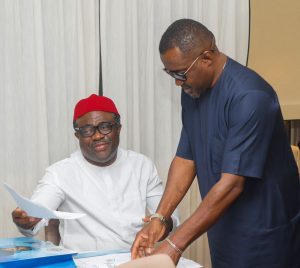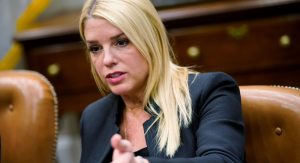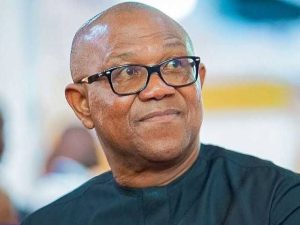Labour Party Chairman Julius Abure Threatens To Expose Peter Obi, Others, Says: ‘If I Speak, They Will Be Like Rotten Eggs
The internal tensions that have quietly haunted the Labour Party (LP) since the 2023 general elections exploded into public view this week, as the party’s National Chairman, Barrister Julius Abure, launched an unprecedented attack against prominent party figures—including the party’s most visible asset, former presidential candidate Peter Obi. In a fiery speech delivered at an LP meeting and captured in a viral video published by Symfoni TV on May 13, 2025, Abure did not mince words. He accused some party stakeholders of hypocrisy, financial abandonment, and betrayal.
Most sensationally, he threatened to expose explosive secrets about Obi and others, warning ominously, “If I speak, they will be like rotten eggs.”
The statement sent shockwaves through political circles and the Obidient movement—Obi’s expansive and passionate supporter base—raising questions about the survival of the party, the integrity of its leaders, and the fate of Nigeria’s most promising political alternative since the Fourth Republic began.
The Labour Party stunned the political establishment in 2023 when, against all odds, it became a third-force challenger to the two dominant political parties—All Progressives Congress (APC) and People’s Democratic Party (PDP). The candidacy of Peter Obi, a former governor of Anambra State, electrified millions of young Nigerians disenchanted with decades of corruption, insecurity, and poverty.
Obi’s campaign, amplified by a tech-savvy youth movement and diaspora supporters, transformed the LP into a national platform almost overnight. Though he came third in the presidential poll, LP secured one state governorship (Abia), several seats in the National Assembly, and hundreds of thousands of loyal followers.
But while the outside world celebrated this meteoric rise, insiders have long whispered of discontent within. Accusations of lack of structure, poor transparency, and power hoarding by the National Working Committee under Abure have periodically surfaced. Tensions with Peter Obi’s loyalists have simmered under the surface.
Now, they have burst open.
YOU MAY READ
Alex Otti Is Not Only a Dwarf in Appearance, He Is a Dwarf in Knowledge”—Julius Abure’s Blistering Rebuke of the Abia Governor
Standing before a crowd of party loyalists, Abure went off-script. In tones oscillating between righteous indignation and veiled threat, he dared Obi and others to publicly declare what they contributed to the party.
“Today, I want to challenge all of them—from Peter Obi down that contested the election. Let any of them come out and tell the world what they personally gave to me or to the party,” Abure declared.
He accused LP’s candidates of failing to financially support the party during the 2023 elections. While they ran on its ticket and won elections, he said, they allegedly contributed little or nothing to sustain the platform they benefitted from.
Specifically targeting the governor of Abia State, Alex Otti, he added:
“Look at the governor that is jumping like cricket from one point to another. We didn’t collect a dime from him. If he paid anybody, let him come and say so.”
Most damning was his threat:
“When I open my mouth, wherever they go to, they will be like smelly egg, rotten egg that nobody will ever buy. I have kept quiet enough.”
The metaphor was clear: the reputations of Obi and others rest on silence. If he speaks, the illusion of purity may be shattered.
Observers say Abure’s outburst reflects deeper fissures within the LP. What began as ideological disagreements over the future of the party has now morphed into mutual suspicion, finger-pointing, and what some analysts describe as a brewing civil war.
Behind closed doors, there are questions about how party funds were raised and spent. Who bankrolled the campaigns? Who controlled the disbursement of resources? Was there internal accounting?
Peter Obi has built his political brand on transparency, fiscal discipline, and ethics. His campaign was seen by many as a beacon of hope—a rarity in a country where trust in politicians is historically low. But Abure’s remarks cast a cloud over this narrative. If there were undisclosed transactions, if funds exchanged hands under informal arrangements, the consequences could be politically fatal.
As of the time of this report, Peter Obi has not issued a public response. This silence is strategic, say insiders. He does not want to engage in a public war of words that could damage the party further. But it’s a dangerous strategy too.
If Abure continues to control the narrative unchecked, supporters may begin to doubt Obi’s previously unblemished image. The longer he stays silent, the more it could be seen as a tacit admission—or weakness.
Moreover, the Obidient movement, made up largely of social media-savvy youths, does not tolerate political silence well. They demand accountability and communication. They want to know if their support and donations were abused or misappropriated.
With Nigeria’s next general elections just two years away, political parties are already strategizing. The APC, under President Bola Tinubu, is consolidating power. The PDP remains a battered but still significant player.
For LP, this crisis couldn’t come at a worse time.
The party was expected to be the moral and policy-driven alternative. If it falls apart now, disillusioned voters may simply return to old patterns—or abstain entirely.
YOU MAY READ
LP Lawmakers Haven’t Given Party a Dime Since 2023 Elections – Abure
This is why the stakes are so high. It is not just about Julius Abure or Peter Obi. It is about millions of Nigerians who believed, for once, that their votes mattered.
The greatest curiosity is about the secrets Abure claims to hold. Could he be bluffing, playing a high-stakes political poker game to force Obi to the negotiation table? Or does he genuinely have evidence—transactions, messages, receipts—that could embarrass or incriminate?
If Abure speaks, it will either destroy his rivals or himself. If he doesn’t, his credibility may already be eroded.
By invoking the imagery of “rotten eggs,” Julius Abure has invited the public to imagine decay—something once whole, now putrid. But it’s not just individuals at risk. The entire Labour Party project, including its grassroots energy, reformist ambitions, and democratic potential, now teeters on the edge of reputational collapse.
The only thing that can save it now is truth, transparency, and reconciliation. Nigerians are watching. The world is watching.
Will the Labour Party clean its house or break it down?





